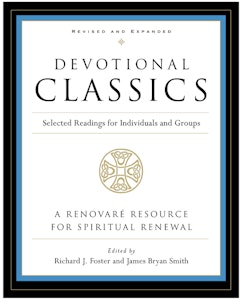Introductory Note:
In Life Together Bonhoeffer makes crystal clear the fundamental difference between radical Christian fellowship and the community of natural desire. With sadness I have had to recognize that the very way we arrange our lives in America effectively excludes us from life together. To take Bonhoeffer seriously would mean such a total rethinking of the life of faith that the entire socioeconomic structures of our lives would be revolutionized.
Life Together is a salty book to dig into if you are tired of “sweetness and light for God’s little flock” and are prepared for “costly grace.”
Richard J. Foster
Renovaré Founder
 Excerpt from Devotional Classics
Excerpt from Devotional Classics
1. In and Through Jesus Christ
Christianity means community through Jesus Christ and in Jesus Christ. No Christian community is more or less than this. Whether it be a brief, single encounter or the daily fellowship of years, Christian community is only this. We belong to one another only through and in Jesus Christ.
What does this mean? It means, first, that a Christian needs others because of Jesus Christ. It means, second, that a Christian comes to others only through Jesus Christ. It means, third, that in Jesus Christ we have been chosen from eternity, accepted in time, and united for eternity.
First, the Christian is the man who no longer seeks his own salvation, his deliverance, his justification in himself, but in Jesus Christ alone. He knows that
God’s Word in Jesus Christ pronounces him guilty, even when he does not feel his guilt, and God’s Word pronounces him righteous, even when he does not feel that he is righteous at all. The Christian no longer lives of himself by his own claims and of his own justification, but by God’s claims and God’s justification. He lives wholly by God’s Word pronounced upon him whether that Word declares him guilty or innocent.
2. Alien Righteousness
The death and the life of the Christian is not determined by his own resources; rather he finds both only in the Word that comes to him from the outside, in God’s Word to him. The Reformers expressed it this way: Our righteousness is an “alien righteousness,” a righteousness that comes from outside of us (extra nos). They were saying that the Christian is dependent on the Word of God spoken to him. He is pointed outward, to the Word that comes to him.
The Christian lives wholly by the truth of God’s Word in Jesus Christ. If somebody asks him, Where is your salvation, your righteousness? he can never point to himself. He points to the Word of God in Jesus Christ which assures him salvation and righteousness. He is as alert as possible to this Word. Because he daily hungers and thirsts for righteousness, he daily desires the redeeming Word.
And it can come only from the outside. In himself he is destitute and dead. Help must come from the outside, and it has come and comes daily and anew in the Word of Jesus Christ, bringing redemption, righteousness, innocence, and blessedness.
3. Christ in the Word of Another
But God has put this Word into the mouth of others in order that it may be communicated to us. When one person is struck by the Word, he speaks it to others. God has willed that we should seek and find his living Word in the witness of a brother, in the mouth of a man. Therefore, the Christian needs another Christian who speaks God’s Word to him. He needs him again and again when he becomes uncertain and discouraged, for by himself he cannot help himself without belying the truth.
He needs his brother as a bearer and proclaimer of the divine word of salvation. He needs his brother solely because of Jesus Christ. The Christ in his own heart is weaker than the Christ in the word of his brother; his own heart is uncertain, his brother’s is sure.
And that also clarifies the goal of all Christian community: they meet one another as bringers of the message of salvation. As such, God permits them to meet together and gives them community. Their fellowship is founded solely upon Jesus
Christ and this “alien righteousness.” All we can say, therefore, is: the community of Christians springs solely from the Biblical and Reformation message of the justification of man through grace alone; this alone is the basis of the longing of Christians for one another.
4. Christ Opened the Way
Second, a Christian comes to others only through Jesus Christ. Among people there is strife. “He is our peace,” says Paul of Jesus Christ (Eph. 2:14). Without Christ there is discord between God and man and between man and man. Christ became the Mediator and made peace with God and among men.
Without Christ we should not know God, we could not call upon him, nor come to him. But without Christ we also could not know our brother, nor could we come to him. The way is blocked by our own ego. Christ opened the way to God and to our brother. Now Christians can live with one another in peace; they can love and serve one another; they can become one. But they can continue to do so only by way of Jesus Christ are we one, only through him are we bound together. To eternity he remains the one Mediator.
5. We Are in Him
Third, when God’s Son took on flesh, he truly and bodily took on, out of pure grace, our being, our nature, ourselves. This was the eternal counsel of the triune God. Now we are in him. Where he is, there we are too, in the incarnation, on the Cross, and in his resurrection. We belong to him because we are in him. That is why the Scriptures call us the Body of Christ.
But if, before we could know and wish it, we have been chosen and accepted with the whole Church in Jesus Christ, then we also belong to him in eternity with one another. We who live here in fellowship with him will one day be with him in eternal fellowship.
He who looks upon his brother should know that he will be eternally united with him in Jesus Christ. Christian community means community in and through Jesus Christ. On this presupposition rests everything that the Scriptures provide in the way of directions and precepts for the communal life of Christians.
6. Made Ready to Forgive
“But as touching brotherly love ye need not that I write unto you: for ye yourselves are taught of God to love one another.… but we beseech you, brethren, that ye increase more and more” (1 Thess. 4:9, 10, KJV). God himself has undertaken to teach brotherly love; all that men can do to add to it is to remember this
divine instruction and the admonition to excel in it more and more. When God was merciful, when he revealed Jesus Christ to us as our Brother, when he won our hearts by his love, this was the beginning of our instruction in divine love.
When God was merciful to us, we learned to be merciful with our brethren. When we received forgiveness instead of judgment, we, too, were made ready to forgive our brethren. What God did to us, we then owed to others. The more we received, the more we were able to give; and the more meager our brotherly love, the less were we living by God’s mercy and love. Thus God himself taught us to meet one another as God has met us in Christ. “Wherefore receive ye one another, as Christ also received us to the glory of God” (Rom. 15:7, KJV).
7. The Basis of Our Community
In this wise does one, whom God has placed in common life with other Christians, learn what it means to have brothers. “Brethren in the Lord,” Paul calls his congregation (Phil. 1:14). One is a brother to another only through Jesus Christ. I am a brother to another person through what Jesus Christ did for me and to me; the other person has become a brother to me through what Jesus Christ did for him.
The fact that we are brethren only through Jesus Christ is of immeasurable significance. Not only the other person who is earnest and devout, who comes to me seeking brotherhood, must I deal with in fellowship. My brother is rather that other person who has been redeemed by Christ, delivered from sin, and called to faith and eternal life.
Not what a man is in himself as a Christian, his spirituality and piety, constitutes the basis of our community. What determines our brotherhood is what that man is by reason of Christ. Our community with one another consists solely in what Christ has done to both of us. This is true not merely at the beginning, and though in the course of time something else were to be added to our community; it remains so for all the future and to all eternity.
I have community with others and I shall continue to have it only through Jesus Christ. The more genuine and the deeper our community becomes, the more will everything else between us recede, the more clearly and purely will Jesus Christ and his work become the one and only thing that is vital between us. We have one another only through Christ, but through Christ we do have one another, wholly, and for all eternity.
That dismisses once and for all every clamorous desire for something more. One who wants more than what Christ has established does not want Christian brotherhood. He is looking for some extraordinary social experience which he has not found elsewhere; he is bringing muddled and impure desires into Christian brotherhood. Christian brotherhood is not an ideal which we must realize; it is rather a reality created by God in Christ in which we may participate.
Excerpts taken from Devotional Classics: Selected Readings for Individuals and Groups (Richard J. Foster & James Bryan Smith, Editors. HarperCollins, 1993.) Origintally from Life Together, first published in German in 1939 and in English in 1954.
Text First Published December 1938 · Last Featured on Renovare.org July 2021


